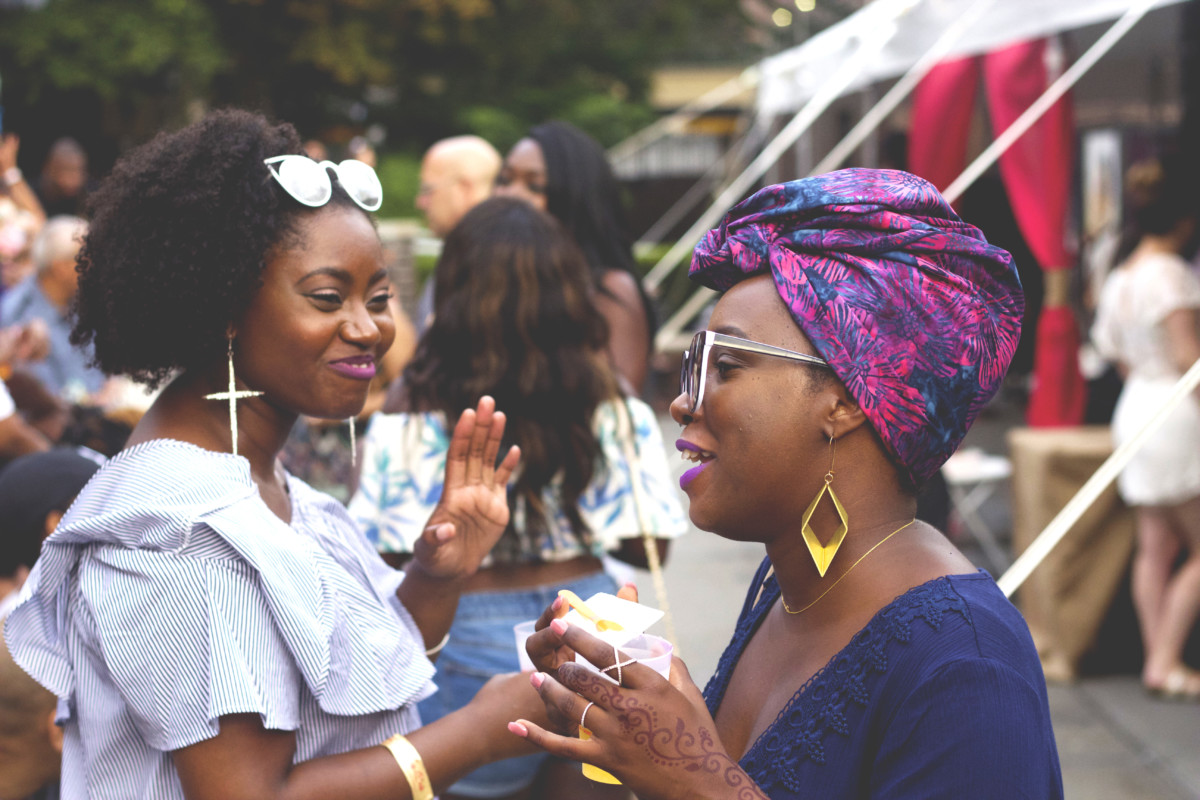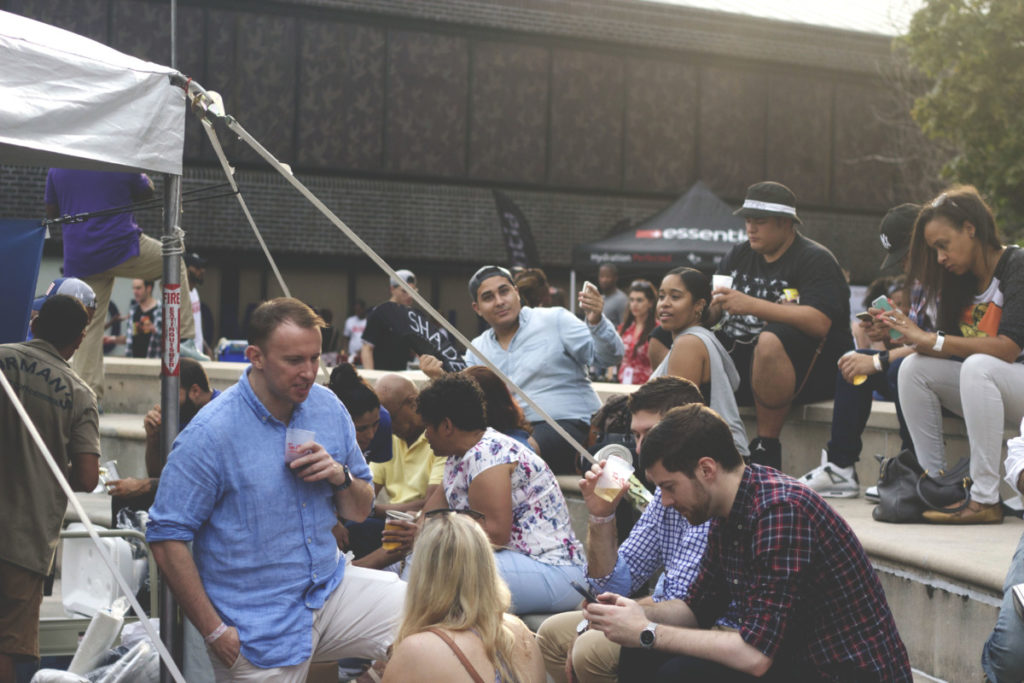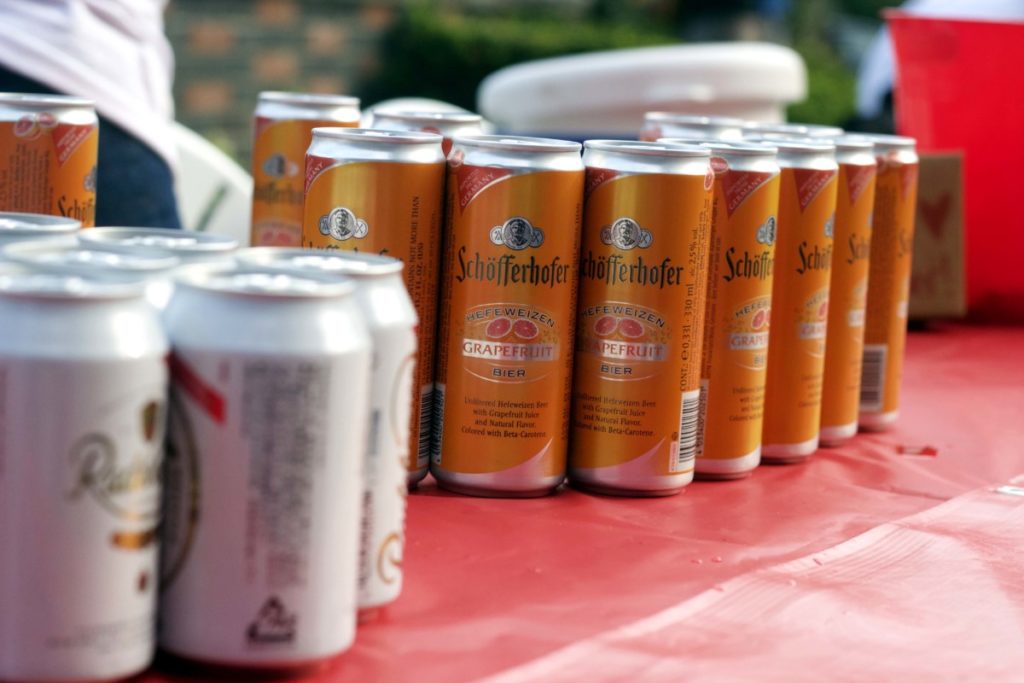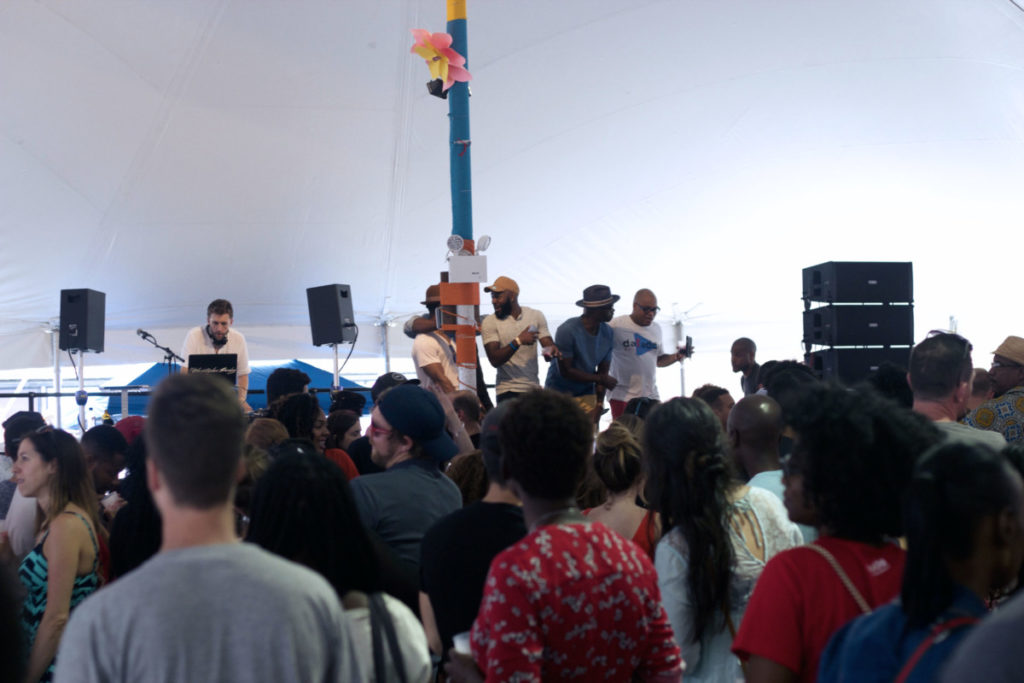
Bed-Stuy has been predominantly African-American and Afro-Caribbean for the past half century. In the past two decades, of course, a lot of new businesses have opened and the neighborhood demographics have changed drastically—In Bedford alone, the Caucasian population has increased by more than 633 percent, according to NYC census data, while the African-American population decreased by almost 15 percent between 2000 to 2010. Gentrification has certainly brought hurt feelings and financial losses to the historically black community. But such changes brought benefits to local artists and longtime residents too. The brief history of the Tap+Cork beer and wine festival traces such an arc.
Tai Allen moved to Bed-Stuy 27 years ago, when he was a teenager. That was in the 1990s, when local musicians Jay-Z and Biggie came to prominence and became icons of hip-hop culture. For many people who grew up in Brooklyn at that time, hip-hop was a part of their shared memory and a cultural symbol of the community. In 2012, when Allen was 40, he and a couple of friends and business partners decided to dedicate his birthday party to Bad Boy records and Rock-A-Fella, two major hip-hop labels, the latter co-founded by Jay-Z.
But the tribute Allen and his friends paid to the hip-hop artists turned out to be more than just a party; it was the beginning of the Tap+Cork beer and wine festival. “That’s what kicked it off,” said the co-founder of the festival, Jarrell Greene, aka DJ CEO. Greene started doing DJ gigs, first at house parties, in 1997. He had been friends with Allen for five years already at the time. That first party was held at Dekalb Market, an outdoor space made out of containers with a performance venue on Fulton Street in Downtown Brooklyn (a food hall has opened under that name this year, in a different location.) The site no longer exists. “That’s the con of gentrification,” Greene said, “It was a great space. All the vendor shops were in containers. It got sold and became a condo or something. Oh, I think there’s a brand new mall there now.”
In its first year, the party was small. “It was literally like someone’s back yard, in the summer. There were only a few tables—I don’t think there were any beers, only some wines,” said Damian Baynes, a photographer and three-time visitor who came back this year and took portraits of the guests. Baynes estimates 40 to 50 people came on that day, and the price was “definitely a lot cheaper back then, probably five to 10 dollars.”
Perhaps it was not surprising that not many people showed up the first year. “Beer and wine is not a big thing, particularly when it comes to the black community,” Greene said. He confessed that he “had personal reservations” about staging the event in Bed-Stuy at first. Allen, a musician, poet, and the creative director of the festival, on the other hand, was confident about doing something for their neighborhood and having some fun in the process. “I wanted to create an event in Bed-Stuy like what you could find in Dumbo or Park Slope. Who said black people couldn’t enjoy artisanal wine and have some highbrow fun?”

Greene and Allen both have strong ties to Bed-Stuy. Greene wanted to make the festival all-inclusive, serving both old residents and newcomers. Allen wanted to help the local small businesses by drawing traffic to them. Five years later, the festival continues to be a one-day summer event that combines drinks, food, and music. This year it was held on Aug. 12. But since 2013, the venue has moved to the front patio of the Restoration Plaza on Fulton Street. According to Allen, Tap+Cork attracts 1,000 to 1,200 people on average, and this year, more than 40 vendors participated. The ticket also got more expensive. General admission was $35 online and $40 at the door this year, up from $25 last year. A ticket included 15 drink tickets and a commemorative sampling cup. Allen estimates that this year’s crowd was about 60 percent local residents and 40 percent visitors.
Bekah Thomas was one of the visitors, a repeat from last year. She traveled for 45 minutes from Long Island City to attend, and said that she would come back again next year too: “I just love the eclectic crowd. The combination of all the different components makes it special. Area, people, music and of course, alcohol. I will say there were less people of color this year.”
Ary Azmir, another second-year attendee, came from Harlem. “The music that was played was amazing! I’m a big sucker for old-school hip hop and R&B. The staff were very friendly, with lots of energy! Last year there were CRAZY lines so my friend and I stayed at the VIP lounge for the majority of the event.” This year she got her VIP tickets on Groupon, which was $40 for two as opposed to $40 for one general admission at the door, and they were served Caribbean food, which she found delicious. “This year the beer won, especially the fruity or flavored ones. Last year I liked the wine better.” However, she also commented that the event had become pricier, and she was not sure if she would come back next year. “My friend purchased an ice cream sandwich for $12,” Azmir said, “which is a bit ridiculous.”

Ashley Pellot, who lives in the Lower East Side, said that her friend initially told her about the event on social media, and they had been going for the past three years. “It never disappoints,” Pellot said. “It was always so crowded and they made it seem more spacious.”
The food and drink vendors increased largely because cafes, bars, and restaurants have been sprouting in Bed-Stuy over the past decade. “I’d say 10 years ago, cafes didn’t exist. A beer and wine festival had never happened before, and people didn’t think it was possible to do in Bed-Stuy,” Allen said. According to Allen, gentrification brought expansion in business and culture in Bed-Stuy—and brought more opportunities for local people, people of color, and women, which is an “underreported scene.” It also enabled him to get vendors more easily, since they wanted to promote themselves through the festival.
One such vendor is Sofia and Grace Cookie Company, which started in December 2016. It is a black-owned bakery located in Bed-Stuy, named after the two-year-old twin daughters of the owner, Hazel Vasquez. He said that Tai Allen just walked into the shop one day and it turned out that his co-founder, Jarrell Greene, and Vasquez’s wife had gone to college together. “He told us about the event and we asked, ‘Could we have a table?’”
When asked whether the festival had made his business more popular, Vasquez noted that the cookie shop has had more followers on Instagram as a result. Island Pops, another locally owned small business that got scouted by Allen, says it too benefited from the event. The owners, Khalid Hamid and his wife Shelly Marshall, launched their all-natural handmade frozen dessert business in 2015, after Marshall took a gourmet ice cream course at Penn State University. “We were told in our West Indies community that there were needs for frozen desserts,” said Hamid. Later he met Allen at a trade show at Brooklyn East; Allen liked Hamid’s popsicles and invited him to the festival.
Participation in the festival helped with Island Pops’ brand building, according to Hamid, especially because they don’t have a storefront yet, just made-to-order delivery services using a shared kitchen space Hamid and wife rented in Bed-Stuy. “It’s the first year we attended the festival. I think it’s a really nice festival because you see all cultures represented and a mixed audience. It’s a good opportunity for people to familiarize with our business,” Hamid said. Because of gentrification, he added, “there are more people willing to spend more money on small businesses.”
Greene says one thing he has missed about the old times from his youth in Clinton Hill, which was considered a part of Bed-Stuy at the time, was the block party, a summertime staple of the black communities. Such parties are in decline these days, he said, because “the new neighbors might not like it and call the cops if you are too loud.” But he and his partners believe they have successfully turned Tap+Cork beer and wine festival into a giant block party, one that reaches beyond Brooklyn and even outside New York City. Demi Grace, London-born singer and model, performed six songs at this year’s festival. She estimates that there were at least 1,500 people there: “I was there from 11 a.m. to 7 p.m. I don’t remember if I had time to eat because I had to make sure everything was alright. But seeing the diverse crowd is a huge perk on its own,” Grace said.
“I wouldn’t say gentrification benefited the community,” Allen said. “But I will admit that it had some benefits to me personally because I made a lot of money. I’m a freelance artist, and now I don’t need to go to downtown Brooklyn or Manhattan to perform anymore, which wasn’t possible 10 years ago. For example, I collaborated with Richards Beavers Gallery once, and it was only eight minutes’ walk from my back yard. People don’t go to Laundromats to hear you sing and perform. They go to bars, cafes, and restaurants. I know the events we host have an impact on the community, and I want to make it a positive one.”


Leave a Reply